Lesson2 CountNon&Count Nouns可数不可数名词
新概念英语第二册第二课
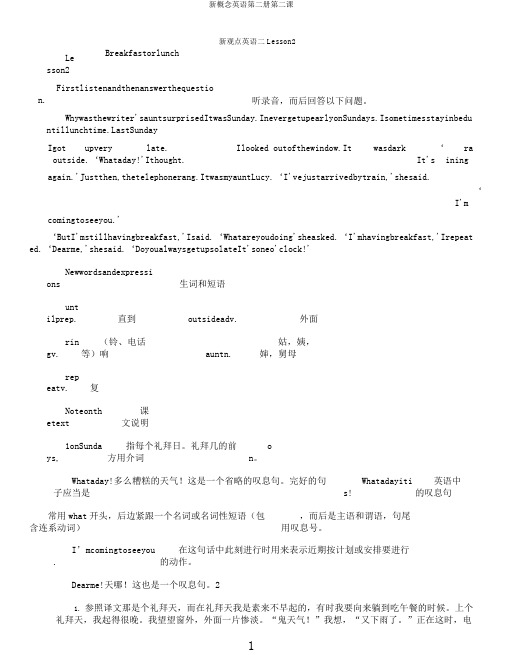
新观点英语二Lesson2Lesson2BreakfastorlunchFirstlistenandthenanswerthequestion.听录音,而后回答以下问题。
Whywasthewriter'sauntsurprisedItwasSunday.InevergetupearlyonSundays.Isometimesstayinbedu stSundayIgot upvery late. Ilooked outofthewindow.It wasdark outside.‘Whataday!'Ithought.‘It'srainingagain.'Justthen,thetelephonerang.ItwasmyauntLucy.‘I'vejustarrivedbytrain,'shesaid.‘I'm comingtoseeyou.'‘ButI'mstillhavingbreakfast,'Isaid.‘Whatareyoudoing'sheasked.‘I'mhavingbreakfast,'Irepeat ed.‘Dearme,'shesaid.‘DoyoualwaysgetupsolateIt'soneo'clock!'Newwordsandexpressions生词和短语untilprep.直到outsideadv.外面rin gv.(铃、电话等)响auntn.姑,姨,婶,舅母rep eatv.重复Noteonth etext课文说明1onSunda ys,指每个礼拜日。
礼拜几的前方用介词on。
Whataday!多么糟糕的天气!这是一个省略的叹息句。
完好的句子应当是Whatadayitis!英语中的叹息句常用what开头,后边紧跟一个名词或名词性短语(包含连系动词),而后是主语和谓语,句尾用叹息号。
[全]新概念英语(第2册第2课)详解
![[全]新概念英语(第2册第2课)详解](https://img.taocdn.com/s3/m/f44b786edd3383c4bb4cd2ef.png)
新概念英语(第2册第2课)详解新Lesson 2 (标★者核心解析)1. ★until [ən'til, ʌn'til] prep.直到2. ★outside [aut'said] ad.外面3. ★ring [riŋ] v.(铃、电话等)响4. aunt [ɑ:nt] n.姑,姨,婶,舅妈5. ★repeat [ri'pi:t] v.重复;重说1. until [ən'til] prep.直到。
作介词及连词preposition, conjunction一、基本词义及用法————————————————1 up to the time that,到…时;直到…时,用语肯定句I was up until three o'clock trying to get it finished! 为了完成工作,我一直干到3点!We had better wait until Antony's here? 我们最好等到安东尼来。
————2 not until not before a particular time or event 直到…才。
用语否定句。
We didn't eat till past midnight. 直到过了午夜我们才吃东西。
What ever we do, won't stop until it's finished. 不论做什么,我们都不会半途而废。
——————3. 常见定势思维❌错误:(1)COMMONLEARNER ERROR: until now or so far?Warning: choose the correct adverb! 注意:選擇正確的副詞!(A)Use 'until now' to talk about a situation that existed, but has just ended: ‘until now’用於表示剛剛結束的過去的某種情況。
NCE-2-lesson2

7."It's raining again."
又下雨了。 体现下雨、下雪、踢球、读书等动作多用进行时态。 It is snowing in great flakes. 正值大雪纷飞。
We are playing football on the street. 我们在街上踢球。
I am reading a letter now. 我正在第一封信。
He is leaving。他就要准备走了。
We are starting。我们准备开始了。
Most young people will be meeting the pop singers at the
airport。
大多数年轻人即将在机场迎接这些流行歌手。
11." But I'm still having breakfast," I said.
Jane is just dressing up. 简正在打扮。
Mrs. Smith is cooking now. 史密斯太太目前正在做饭。
一般目前时能够表达习惯性动作,往往与频度副词连用, 如often, always, sometimes, never等:
Do you often come here? 你常来这儿吗? Helen never writes to her brother Tony.
dinner正餐(多为晚餐);snack原指小吃,可指夜宵, meal广义上旳“餐”,没有时间限制。
3、Last Sunday I got up very late. 上周日我起得很晚。
(1)Last Sunday为前置时间状语,也能够放于句尾。 (2) 变化如下:
(3) I got up very late last Sunday. (4) 但时间状语前置更强调时间。 (2 )比较学习:
冀教版英语七年级上册 2. Lesson 2
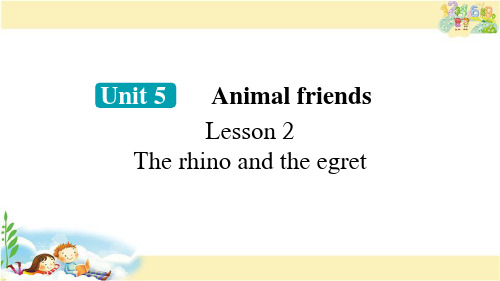
insect [ˈɪnsekt]n.昆虫
A fly is a kind of insect.
We sometimes make sounds to
scare them.
scare [skeə]v.惊吓;使 sound [saʊnd]n.声音;响声
我很喜欢读各种类型的书籍。
4. They are also helping each other help each other 意为“互相帮助”。
eg: We often help each other with schoolwork. help其他短语: help sb. with...帮助某人…… help sb. (to) do sth. 帮助某人做某事
One (一个)
another(另一个) 总数大于等于3 eg: This coat is too small. Please show me another one.
some(一些) the others(其他所有,无剩余)
eg: Some are from Beijing, the others are from Shanghai.
Unit 5 Animal friends
Lesson 2 The rhino and the egret
1.获取和梳理本篇说明文的内容,了解犀牛和白鹭的故事,提 取犀牛和白鹭如何共生的信息,形成信息结构图。(学习理解) 2. 通过介绍犀牛和白鹭的故事,意识到互帮互助的重要性,从 而培养团队协作能力。(应用实践) 3.运用本课所学句型,结合信息结构图,学习用准确的语言讲 述自己和同伴之间互帮互助的经历和体会。(迁移创新)
新概念英语第2册课程讲义Lesson2

Lesson2单词讲解1.until prep.直到until nowuntil lunchtime2.outside adv.外面insideupside down3.ring v.(铃,电话等)响ring rang rungsing sang sungdrink drank drunkswim swam swumbegin began begunring n.4.repeat v.重复re-retellrewriterediscoverRebroadcastLesson2课文&语法讲解一般现在时现在进行时感叹句一般现在时现在进行时时态?如何体现?一共多少种?一般现在时谓语v.=原形/第三人称单数(do/does)I tell you a secret.He tells you a secret.Your friend tells you a secret.一般现在时谓语v.=原形/第三人称单数(do/does)用法1:表示现在经常性习惯性的动作We have the English class every day.He often gets up late.always,usually,often,sometimes,never…一般现在时谓语v.=原形/第三人称单数(do/does)用法2:表示现在的状态I am a teacher.We are happy together.一般现在时谓语v.=原形/第三人称单数(do/does)用法3:表示永恒The earth is round.The earth moves around the sun.Practice makes perfect.一般现在时变否定/疑问现在进行时谓语v.=am/is/are+doing用法1:表示现在正在进行的事We are studying English now.J.K.Rowling is writing another book this year.现在进行时谓语v.=am/is/are+doing用法2:表示将来确定要发生的事I am coming to see you.We are arriving at....The old man is dying.现在进行时变否定/疑问He is listening.He is not listening.Is he listening?What is he doing?1.It was Sunday.2.I never get up early on Sundays.3.I sometimes stay in bed until lunchtime.4.I looked out of the window.5.It was dark outside.6.'What a day!'I thought.感叹句:What+n./n.词组!How+adj./adv.! What a wonderful world!How interesting!7.'It's raining again.’8.Just then,the telephone rang.9.It was my aunt Lucy.10.'I've just arrived by train,'she said.11.'I'm coming to see you.’12.'But I'm still having breakfast,'I said.13.'What are you doing?'she asked.14.'I'm having breakfast,'I repeated.15.'Dear me,'she said.16.'Do you always get up so late?17.It's one o'clock!'Lesson2知识拓展本课重点:一般现在时do/does 现在进行时am/is/are+doing一般现在时/现在进行时Right now I’m in class.I(sit)_______________at my desk.I usually(sit)_______________at the same desk in class every day.一般现在时/现在进行时Right now I’m in class.I am sitting at my desk.I usually sit at the same desk in class every day.一般现在时/现在进行时Ali(speak)_______________Arabic.Arabic is his native language,but right now he(speak)_______________English.一般现在时/现在进行时Ali speaks Arabic.Arabic is his native language,but right now he is speaking English.一般现在时/现在进行时A:(it,rain)_______________a lot in southern California?B:No.The weather(be)_______________usually warm and sunny.一般现在时/现在进行时A:Does it rain a lot in southern California?B:No.The weather is usually warm and sunny.一般现在时/现在进行时A:I’ll take those-the yellow flowers.B:Here you are,mister.Are they for a special occasion?A:I(buy)_______________them for my wife.I(buy)_______________her flowers on the first day of every month.一般现在时/现在进行时A:I’ll take those-the yellow flowers.B:Here you are,mister.Are they for a special occasion?A:I am buying them for my wife.I buy her flowers on the first day of every month.本课重点:一般现在时do/does 现在进行时am/is/are+doing。
新概念英语第二册第02课
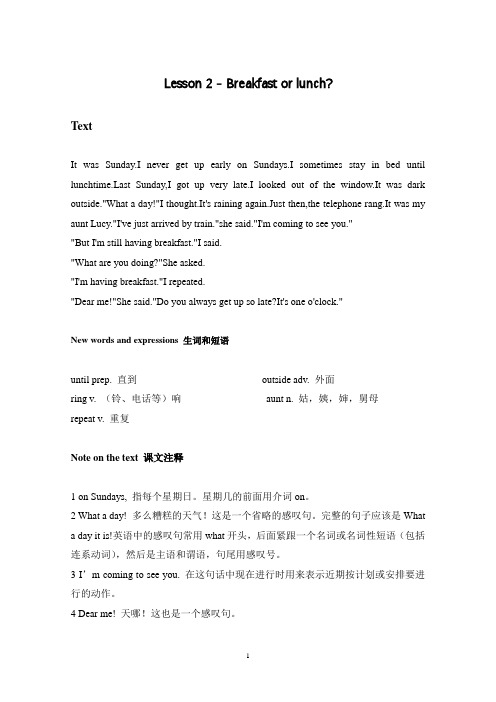
Lesson 2 - Breakfast or lunch?TextIt was Sunday.I never get up early on Sundays.I sometimes stay in bed until st Sunday,I got up very late.I looked out of the window.It was dark outside."What a day!"I thought.It's raining again.Just then,the telephone rang.It was my aunt Lucy."I've just arrived by train."she said."I'm coming to see you.""But I'm still having breakfast."I said."What are you doing?"She asked."I'm having breakfast."I repeated."Dear me!"She said."Do you always get up so late?It's one o'clock."New words and expressions 生词和短语until prep. 直到outside adv. 外面ring v. (铃、电话等)响aunt n. 姑,姨,婶,舅母repeat v. 重复Note on the text 课文注释1 on Sundays, 指每个星期日。
星期几的前面用介词on。
2 What a day! 多么糟糕的天气!这是一个省略的感叹句。
完整的句子应该是Whata day it is!英语中的感叹句常用what开头,后面紧跟一个名词或名词性短语(包括连系动词),然后是主语和谓语,句尾用感叹号。
新概念英语第二册Lesson2说课讲解
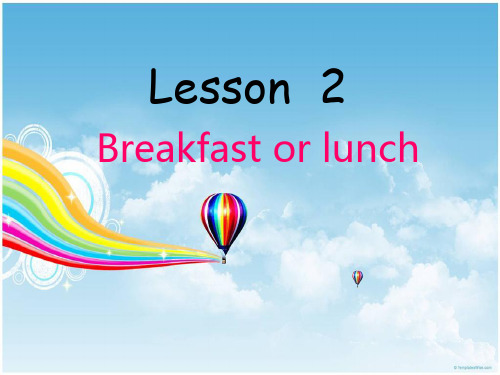
【New words 】
1 until prep. 直到 2 outside adv. 外面 3 ring v. (铃、电话等)响 4 aunt n. 姑,姨,婶,舅母 5 repeat v. 重复
★until prep. 直到
until 用 于表示动
Reading
Predict:
1.What do you think this passage will talk about after reading the title?
2.What is the main idea of the passage?
I always get up late on Sundays. And my aunt was surprised that I was still having breakfast in the afternoon last Sunday.
to wait just outside the door
3. ring (rang, rung)
动词 ①鸣,响(铃,电话等) eg. Every moring the clock ring at 6.
The telephone is ringing. ①打电话给
ring sb. eg. Tomorrow I'll ring you.
直到中午雨才停止。
I did not learn it until yesterday . 到昨天我才知道。
He did not show himself in his true colors until he gained power. 直到他掌权之后,他才露出自己的真 面目。
新概念英语NCE2_Lesson02课件

Notes on the text
• What a day? • What + a + n.——感叹句 • It is a terrible day.==> What a
terrible day! 省略 : 1.主、谓随时可省 what a good girl (she is)! what a good girl (she is)! 2.省形容词 What a day!
发生) • Often , Always——一般现在时 • “现阶段”:I am working as a teacher. • 频率副词往往放在句子中间, 实义动词前, 非实义动词后 • 如果既有实义动词又有非实义动词, 要放在两个之间. • 疑问句中副词往往放在主语后面. • 非实义动词 : • 1.系动词(be) 2.助动词帮助动词构成时态的(do, does, will, shall, have,
• It was Sunday. I never get up early on Sundays. I sometimes stay in bed until lunchtime. Last Sunday I got up very late. I looked out of the window. It was dark outside. 'What a day!' I thought. 'It's raining again.' Just then, the telephone rang. It was my aunt Lucy. 'I've just arrived by train,' she said. 'I'm coming to see you.'
英语初一第二课总结知识点
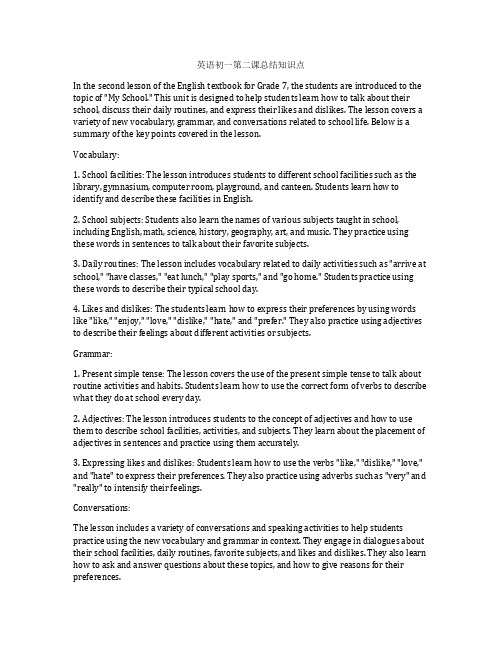
英语初一第二课总结知识点In the second lesson of the English textbook for Grade 7, the students are introduced to the topic of "My School." This unit is designed to help students learn how to talk about their school, discuss their daily routines, and express their likes and dislikes. The lesson covers a variety of new vocabulary, grammar, and conversations related to school life. Below is a summary of the key points covered in the lesson.Vocabulary:1. School facilities: The lesson introduces students to different school facilities such as the library, gymnasium, computer room, playground, and canteen. Students learn how to identify and describe these facilities in English.2. School subjects: Students also learn the names of various subjects taught in school, including English, math, science, history, geography, art, and music. They practice using these words in sentences to talk about their favorite subjects.3. Daily routines: The lesson includes vocabulary related to daily activities such as "arrive at school," "have classes," "eat lunch," "play sports," and "go home." Students practice using these words to describe their typical school day.4. Likes and dislikes: The students learn how to express their preferences by using words like "like," "enjoy," "love," "dislike," "hate," and "prefer." They also practice using adjectives to describe their feelings about different activities or subjects.Grammar:1. Present simple tense: The lesson covers the use of the present simple tense to talk about routine activities and habits. Students learn how to use the correct form of verbs to describe what they do at school every day.2. Adjectives: The lesson introduces students to the concept of adjectives and how to use them to describe school facilities, activities, and subjects. They learn about the placement of adjectives in sentences and practice using them accurately.3. Expressing likes and dislikes: Students learn how to use the verbs "like," "dislike," "love," and "hate" to express their preferences. They also practice using adverbs such as "very" and "really" to intensify their feelings.Conversations:The lesson includes a variety of conversations and speaking activities to help students practice using the new vocabulary and grammar in context. They engage in dialogues about their school facilities, daily routines, favorite subjects, and likes and dislikes. They also learn how to ask and answer questions about these topics, and how to give reasons for their preferences.Cultural knowledge:In addition to language skills, the lesson also provides students with information about school life in English-speaking countries. They learn about the typical school day, extracurricular activities, and school facilities in these countries. This helps students understand the differences and similarities between their own school experiences and those of students in other parts of the world.Overall, the unit on "My School" in the Grade 7 English textbook covers a wide range of vocabulary, grammar, and conversations related to school life. By the end of the lesson, students should be able to talk about their school, describe their daily routines, and express their likes and dislikes in English. They should also have a better understanding of school life in different cultures, which can help them develop a broader perspective on the world.。
新概念英语第二册第二课(包含课文、练习和答案)
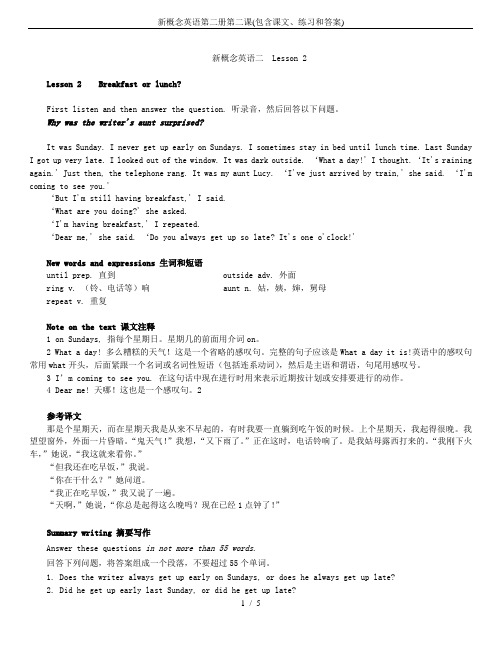
新概念英语二 Lesson 2Lesson 2 Breakfast or lunch?First listen and then answer the question. 听录音,然后回答以下问题。
Why was the writer's aunt surprised?It was Sunday. I never get up early on Sundays. I sometimes stay in bed until lunch time. Last Sunday I got up very late. I looked out of the window. It was dark outside. ‘What a day!' I thought.‘It's raining again.' Just then, the telephone rang. It was my aunt Lucy. ‘I've just arrived by train,' she said. ‘I'm coming to see you.'‘But I'm still having breakfast,' I said.‘What are you doing?' she asked.‘I'm having breakfast,' I repeated.‘Dear me,' she said. ‘Do you always get up so late? It's one o'clock!'New words and expressions 生词和短语until prep. 直到 outside adv. 外面ring v. (铃、电话等)响 aunt n. 姑,姨,婶,舅母repeat v. 重复Note on the text 课文注释1 on Sundays, 指每个星期日。
Lesson2 CountNon
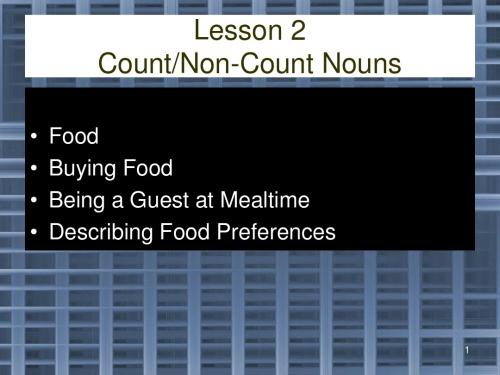
17
.
8
How Much Milk Do You Want?
• how much? • too much • a little
A. How much/many
• how many? • too many • a few
do you want?
B. Not too much/many. Just a few/little. A. Okay. Here you are. B. Thanks.
A. These potatoes are very good*! B. I’m glad you like them.
16
*delicious/very good/excellent/wonderful/fantastic
Role Play: Would You Care for Some More? A. How do you like the ? B. I think (it’s/they’re) delicious. A. I’m glad you like (it/them). Would you care for some more? B. Yes, please. But not too (much/many). Just a (little/few).
13
• coffee
A. How much/many
do you want?
B. Not too much/many. Just a few/little. A. Okay. Here you are. B. Thanks.
14
• meatballs
A. How much/many
do you want?
9
How Much Milk Do You Want?
新概念二册Lesson2 第2课
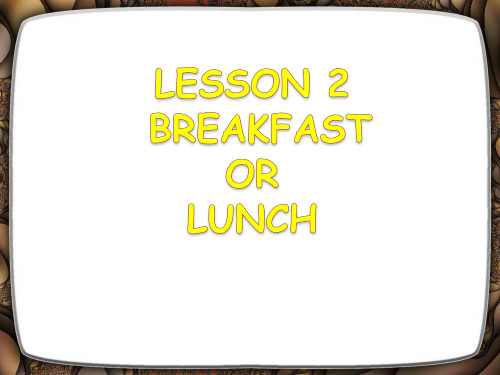
'But I'm still having breakfast,' I said.
have breakfast ['brekfəst] have lunch/dinner brunch 早午饭
will / shall do be going to do
HOW
to express the simple future tense
I never get up early on Sundays.
never seldom rarely occasionally sometimes often frequently usually always以上是表示频率的副词 放在实以动词之前,be动词 助动词(have has had will shall do does did …) 情态动词 (can must need…)之后
3—Look at the noisy kids! —Haven‟t you heard the saying “When the cat is away, the mice ______?” A. play B. played C. are playing D. will play 4【2011上海】8. We are glad to hear that the Greens _____ to a new flat next week. 【2011上海】 A move B. moved C. will move D. have moved
'It's raining again.' Just then, the telephone rang. just then It was my aunt Lucy. it起指示代词的作用,指一个人或事物 —Who is knocking at the door? —It‟s me.
(新)冀教版八年级上册 Lesson 2 (优秀课)教案

初中英语冀教版八年级上册第一单元Lesson 2 Many Faces, One PictureMain aim:At the end of the lesson, students will be able to describe their pictures, using the target language.Subsidiary aims:To provide detailed listening practice in a dialogue in which two students are talking about their pictures.To focus on the language used when describing pictures.Materials:recorder, glue, scissors, pieces of colourful pictures, markers, pencilsAssumptions:Learners have already learned about present simple, present continuous and past simple, and they are familiar with some simple language about one’s name, age, clothes and actions. But they may make mistakes when they describe their pictures. Anticipated problems with materials, activities and tasks: Students may find it difficult to find out which picture Li Ming chose in the recording.Students may make mistakes when writing their description under their picture.Solutions:Let students read the recording script and underline the key sentences for Question 4 in the listening practice.After they write, ask students to correct each other’s mistakes, according to the checklist provided by the teacher.nguageanalysis:Form Meaning PhonologyAnticipated problems andperform (v.)to entertain peopleby dancing,singing,acting, or playingStudents mayfind it difficultand boring to begiven thedefinitions ofeach word, so Iglue (v.)to join thingstogether using glue[ u: ]advise to give someone Skillanalysis:Sub-skill Tasks forskillsPreparinglearnersAnticipatedproblems andPre-listen.Students maymake mistakesSummarizetarget sentences toTeachingprocedures:Summary:________________________________________________________________第二课时一、教材分析本单元主要是围绕谈论时间和喜爱的学来展开话题,通过本单元的学习,使学生了解时间的表达方法和学的学习方法的相关情况,乐于接触并了解异国文化。
【实用文档】小学英语教案:Lesson 2
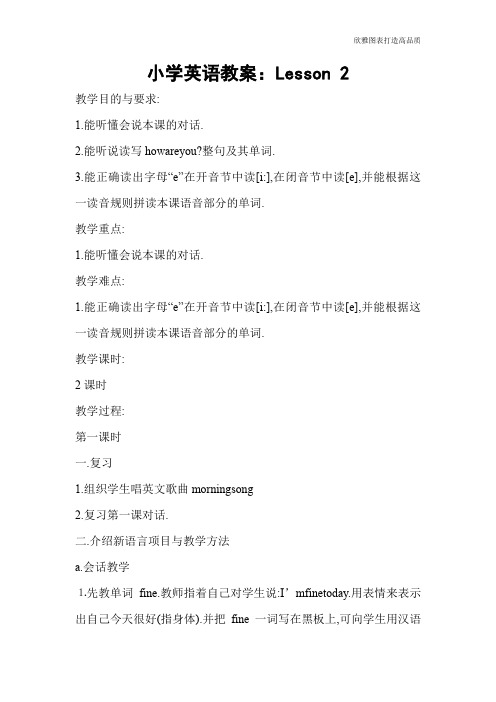
欣雅图表打造高品质小学英语教案:Lesson 2
教学目的与要求:
1.能听懂会说本课的对话.
2.能听说读写howareyou?整句及其单词.
3.能正确读出字母“e”在开音节中读[i:],在闭音节中读[e],并能根据这一读音规则拼读本课语音部分的单词.
教学重点:
1.能听懂会说本课的对话.
教学难点:
1.能正确读出字母“e”在开音节中读[i:],在闭音节中读[e],并能根据这一读音规则拼读本课语音部分的单词.
教学课时:
2课时
教学过程:
第一课时
一.复习
1.组织学生唱英文歌曲morningsong
2.复习第一课对话.
二.介绍新语言项目与教学方法
a.会话教学
⒈先教单词fine.教师指着自己对学生说:I’mfinetoday.用表情来表示出自己今天很好(指身体).并把fine一词写在黑板上,可向学生用汉语。
新概念第二册 Lesson 2 讲义教师版

Lesson 2 Breakfast or lunch?阅读理解1. Did the writer get up early last Sunday?No, he didn’t.2. What was the time?It was one o’clock.单词详解1. until prep. 直到翻译:我们一直走到天黑。
We walked until it got dark.扩展:not…until 直到……才翻译:She can’t leave until Friday. 她直到周五才离开。
2. outside adv. 外面反义词:inside3. ring n. 圈,环词组:ear ring耳环diamond ring 钻戒ring finger食指v. ring - rang - rung翻译:电话铃响了,你为什么不接呢?The phone’s ringing so why not answer it?4. aunt n. 姨,姑,婶,舅妈uncle 伯伯,叔叔,舅舅文化:西方亲属词简化5. repeat v. 重复e.g. He repeated her words.Would you please repeat it? I didn’t quite catch you.= Would you please say it again?课文解析1. It was Sunday.●根据以下例句填空:it可以表示时间、天气的概念或者无明显性别特征的人。
It’s ten past twelve.It’s quite warm at the moment.The doorbell is ringing. It is my aunt.2. I never get up early on Sundays. I sometimes stay in bed until lunchtime.●时态:一般现在时,表示习惯性动作。
2年级英语教案《lesson 2》2
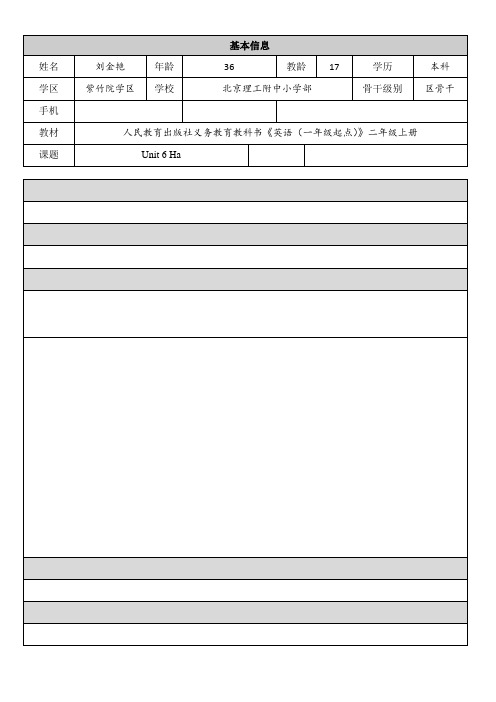
e here!【活动说明】这里利用Ange送的礼物引出即将学习的歌谣,在打开礼品盒之前,请学生充分发挥他们的想象力,猜一猜礼品盒里会是什么,在请学生说之前,教师分别用上一单元刚刚学过的there be 句型的单数和复数形式做示范。
在学生充分猜测后再将礼品盒打开,盒子里跳出了音符。
借此方法呈现本课歌谣并将歌谣播放三遍。
第一遍:看、听视频;第二遍:看对话形式的歌词,听原声朗读并听原声歌谣;第三遍:再次看、听视频。
接下来是小组四人操练歌谣,最后是为Ange表演歌谣。
如下图所示:【设计意图】Ange会送给我们怎样的礼物呢?这时孩子们的好奇心异常高涨,脑海里一定有各自对礼物的想象,为了满足学生的表达欲望,并及时复习there be句型的单、复数形式,教师请大家充分发挥想象力,仿照示范充分输出语言。
在揭开礼物的神秘面纱之后,充分的视听让学生明确歌谣的旋律,而看整体歌词能帮助学生整体记忆歌谣结构,标红单词能帮助学生区分两段歌谣不同之处,而听原声朗读能使学生对歌谣中每一个单词的发音都更加清晰。
作为对Ange的回报,教师倡议把歌谣唱给Ange听,这样学生说得更有积极性,同时潜意识渗透感恩意识。
Ste e here and a it with me 做两组示范,第一组为板书内容的呈现,第二组加Do ou ie it Ye, I do Let’ eno the e Do ou have more an hoida in the ear, do ou now other hoidaS: Sn Da / Chritma Da / Than Giving Da / Haoween…T: Great! Let’ oo at ome hoida together! 播放节日图组T: Among a thi hoida, m favourite hoida i S n Da / Chritma Da / Than Giving Da / HaoweenT: Chritma Da i the bigget hoida in wetern countrie What’ the bigget hoida in China Yeah, it’ San thing on thi da, what do ou want to do on thi daT: Great! What doe Beva do on thi da Let’ hare together!播放视频Beva wear new cothe, new oc, newhoe and new hat on thi da Do ou ie S u i the winner Congratuation!SteeworT: ae a new ear card and ing Ha e It’ time to a goodbe to Ange!S: Goodbe, Ange!A: Goodbe, friend! 说完飞走T:Ca i over Goodbe bo and girS: Goodbe, Wend板书设计学习效果评价设计1 分组得分:本节课我将整个班级分成9个小组,每组由3~4人组成,组长在课上为组员的优秀表现加分,他们的精彩发言、认真聆听、声音洪亮或是其他优点都会成为为组争光的理由,由于每组人数较少,这样每名组员都会记得是谁为组加分,这样就促使没有为组争光的学生积极发言,大胆参与。
北师版小学英语一年级上册Lesson2_知识点总结教案

北京版小学英语一年级英语学习基础很重要,记住单词,默写单词,不要粗心大意。
北京版小学英语和你一起共同进步学业有成!Lesson2 参考教案【内容来源】北京出版社(一起点)一年级上册Unit1 Hello! I’m Maomao一、教学目标与要求(Teaching aims and request)1. 能用“Hi! I m Lingling.” 打招呼和自我介绍,能用“What’s your name?”询问对方姓名。
2. 能认读单词name、a cake、a gate、a lake,感受它们所含有的共同元音音素/eɪ/。
3. 能说唱小韵文Kate,Kate,at the gate。
4. 在询问姓名用语“What’s your name?”的学习中,养成有礼貌地询问同辈人姓名的意识。
二、教学重点、难点(Teaching points and difficulties)(一)重点(Points)1. 询问对方姓名与回答的交际用语。
2. 整体认读name、a cake、agate、a. lake。
(二)难点(Difficulties)1. 感受所学词语中的共同发音/eɪ/。
2. 整体理解韵文含义。
三、课前准备(Teaching preparation)教学挂图(组合图)、语音词卡片、头饰(教材人物)、给学生的奖品、教学音频、教学课件。
四、教学建议(Teaching suggestions)(一) Listen and say1. 导入(1) 师生问候。
教师对学生说:“Hello, boys and girls!”后学生回答。
教师与几位熟悉的学生用“Hello, …!”问好,然后教师选择一位不熟悉的学生问“Hello! What’s your name?” 学生如不能直接回答,教师说出几个错误的名字启发说“Are you...?”等。
待学生说出自己的名字后,教师主动与他/她打招呼。
然后再用同样的方式与2-3位学生交流。
北师版小学英语二年级上册Lesson2 知识点总结教案

北京版小学英语
如果学生先说到 Friday,教师可以回应:“Yes, they are talking about Friday. You know today is Wednesday. Tomorrow is Thursday. And the day after tomorrow is Friday.” 教师可以借助手势、月历等帮助学生理解 Friday 和 tomorrow 的含义。
3. 能模仿录音说唱小韵文。 4. 在谈论每日活动安排时,养成合理安排日常活动的意识。 二、教学重点、难点(Teaching points and difficulties) (一)重点(Points) 1. 能 用 “What day is today / tomorrow?” 询 问 当 天 /明 天 是 星 期 几 并 用 “It’s ... .”做出应答;能用“I ... on ... .” 介绍自己在riday 和 Saturday。 (二)难点 (Difficulties) 1. “What day is tomorrow?”中“is tomorrow”连读时/s/的不完全爆破。 2. Wednesday、Thursday、Friday 等词汇中的共同发音/ei/的口形变化。 三、课前准备(Teaching preparation) 教学挂图(组合图)、单词卡片、头饰(教材人物)、月历、国际象棋、给学生 的奖品(贴纸:Wednesday、Thursday、Friday 等)、教学音频、教学课件等。 四、教学建议 (Teaching suggestions) (一) Listen and say 1. 导入 游戏:Guessing game。 •教师做打乒乓球、打篮球、踢足球、放风筝等动作,请学生猜测动词短 语。 •进行 pair work,一人做动作,另一人来猜。 2. 学习对话 1 (1) 认识图中人物。
- 1、下载文档前请自行甄别文档内容的完整性,平台不提供额外的编辑、内容补充、找答案等附加服务。
- 2、"仅部分预览"的文档,不可在线预览部分如存在完整性等问题,可反馈申请退款(可完整预览的文档不适用该条件!)。
- 3、如文档侵犯您的权益,请联系客服反馈,我们会尽快为您处理(人工客服工作时间:9:00-18:30)。
Sorry, we can’t. There isn’t/aren’t any
.
7
• Let’s have French fries with our hamburgers! • potatoes
• Let’s have meatballs with our spaghetti! • meat
Sorry, we can’t. There isn’t/aren’t any
A. These potatoes are very good*! B. I’m glad you like them.
16
*delicious/very good/excellent/wonderful/fantastic
Role Play: Would You Care for Some More? A. How do you like the ? B. I think (it’s/they’re) delicious. A. I’m glad you like (it/them). Would you care for some more? B. Yes, please. But not too (much/many). Just a (little/few).
10
• rice
A. How much/many
do you want?
B. Not too much/many. Just a few/little.
A. Okay. Here you are.
B. Thanks.
11
• French fries
A. How much/many
do you want?
17
3
Let’s Make Sandwiches for Lunch!
A. Let’s make sandwiches for lunch! B. Sorry, we can’t. There isn’t any br apple pie for dessert! B. Sorry, we can’t. There aren’t any apples.
4
• Let’s make pizza for lunch! • cheese
• Let’s make some fresh lemonade! • lemons .
5
Sorry, we can’t. There isn’t/aren’t any
• Let’s make a salad for dinner! • lettuce
13
• coffee
A. How much/many
do you want?
B. Not too much/many. Just a few/little. A. Okay. Here you are. B. Thanks.
14
• meatballs
A. How much/many
do you want?
• Let’s make an omelet for breakfast! • eggs
Sorry, we can’t. There isn’t/aren’t any
.
6
• Let’s bake a cake for • Let’s make some dessert! fresh orange juice for breakfast! • oranges • flour
B. Not too much/many. Just a few/little. A. Okay. Here you are. B. Thanks.
12
• ice cream
A. How much/many
do you want?
B. Not too much/many. Just a few/little. A. Okay. Here you are. B. Thanks.
B. Not too much/many. Just a few/little. A. Okay. Here you are. B. Thanks.
15
Complimenting About Food
A. This chicken is delicious*! B. I’m glad you like it.
9
How Much Milk Do You Want?
A. How much milk do you want? B. Not too much. Just a little. A. Okay. Here you are. B. Thanks.
A. How many cookies do you want? B. Not too many. Just a few. A. Okay. Here you are. B. Thanks.
Lesson 2 Count/Non-Count Nouns
• • • • Food Buying Food Being a Guest at Mealtime Describing Food Preferences
1
Vocabulary Preview
2
Vocabulary Preview
• • • • • • • • • • • • apples bananas bread cake carrots cheese chicken eggs fish grapes ketchup lemons • • • • • • • • • • • • lettuce mayonnaise meat mustard onions oranges pears pepper potatoes salt soy sauce tomatoes
.
8
How Much Milk Do You Want?
• how much? • too much • a little
A. How much/many
• how many? • too many • a few
do you want?
B. Not too much/many. Just a few/little. A. Okay. Here you are. B. Thanks.
